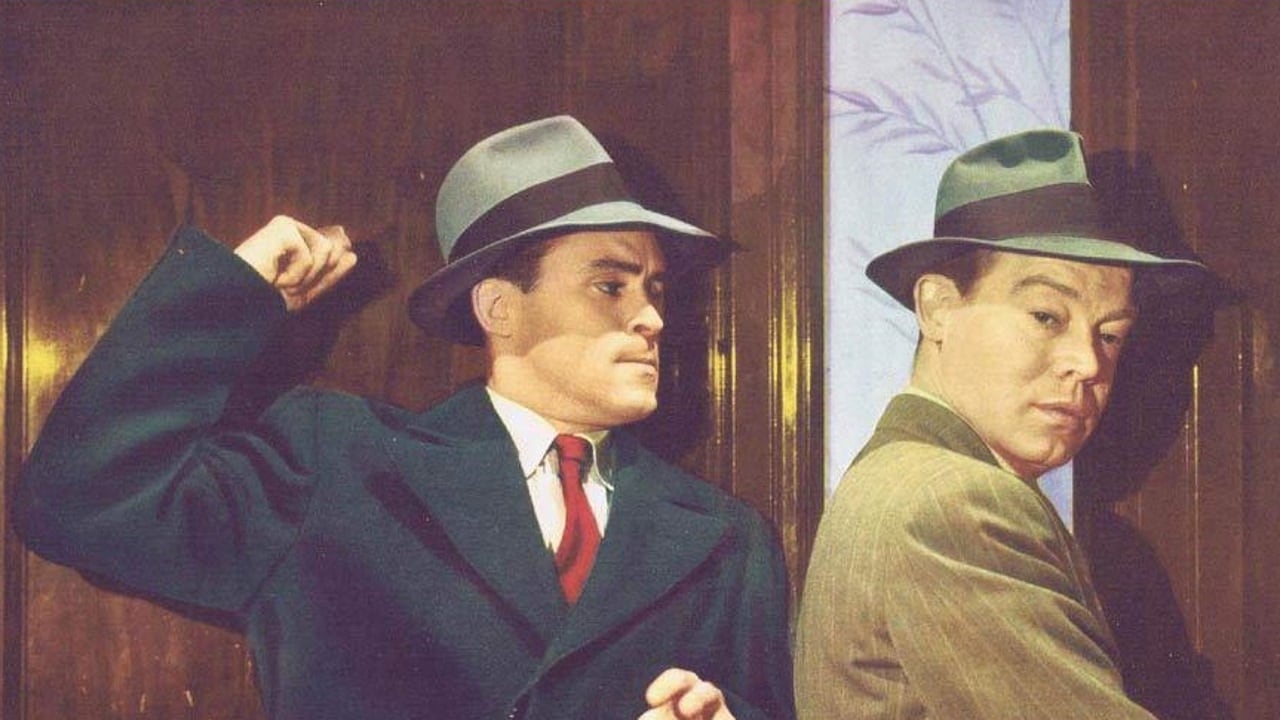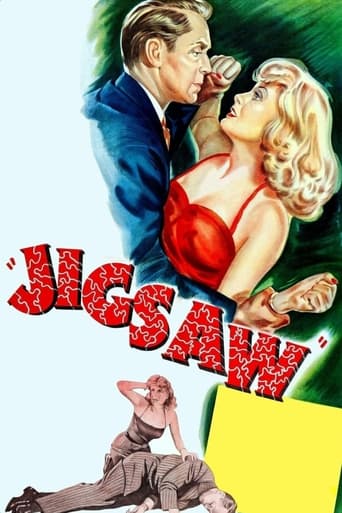

A melodrama about intrepid Assistant D.A. Franchot Tone breaking up a racist 'hate' group called 'The Crusaders'; 'Jigsaw' on paper resembles a rather bold US independent equivalent to Costa-Gavras's Oscar-winning political thriller 'Z' (1969). It also rather recalls Hitchcock's wartime anti-Nazi thriller 'Saboteur' (1942), even down to a memorably sinister cocktail party peopled with wealthy and well-connected reactionaries; plenty of the talk about racism and bigotry still sounds disturbingly topical today. Having made such a bold attack on the far right in their maiden production at the very moment that Hollywood's attention was turning full-time to The Red Menace, it's hardly surprising that the film's producers, the Danziger Brothers, relocated to Britain in 1952.Unfortunately, even though plenty of people get shot, once the shock of the film's crusading politics wears off, the whole thing proves disappointingly diffuse and uninvolving. Don Malkames provides plenty of good noirish photography (concluding with a splendid nighttime shootout in a museum), but first-time director Fletcher Markle (whose best-known directing credit was to be the Disney adventure 'The Incredible Journey' in 1963) is too often plainly trying too hard.A final credit at the end informs us that it "was filmed with the obvious good will of many famous stars", which explains the bewildering cameo appearances by several Hollywood liberals of the period (two of whom - John Garfield and Marsha Hunt - were later actually blacklisted); Marlene Dietrich, exits a scene set in a nightclub called - what else? - 'The Blue Angel' just as Henry Fonda walks into the same shot playing a waiter. These star cameos ironically vie for attention with a regular cast comprised almost entirely of then unknowns presumably recruited from radio and Broadway, including vivid contributions from Myron McCormick, Marc Lawrence, Doe Avedon (making a charming debut under the name 'Betty Harper), Winifred Lenihan, Walter Vaughan (Robert's father, playing the D.A.) and Robert Gist (later a TV director, including 'Star Trek').
... View MoreWOW! What a horrible film - now I understand the negative reviews on this one. Yes it's terrible and has a feeling of a bad soap opera instead of a decent film noir or mystery.Cameos by Marlene Dietrich, Henry Fonda and Burgess Meredith - who cares, you only see them for 2 or 3 seconds! It's not worth your time to watch this terrible film just to see the 3 of them for a couple of seconds in the background. You are much better off watching one of their films instead of this soap opera garbage for cameos.I'm sorry but this film is confusing and just overall dumb - no real direction or story. The cinematography and acting are that of a child instead of great or even slightly good.This is one of the most boring and lamest films I've seen in awhile. It gets a big 2 out of 10 ONLY for the cameos.2/10
... View MoreFranchot Tone stars with then-wife Jean Wallace in "Jigsaw" from 1949. It's a B movie with lots of cameos from stars, I guess who were friends of the director, Fletcher Markle, or friends with someone: John Garfield, Henry Fonda, Marlene Dietrich, Marsha Hunt, Burgess Meredith, Everett Sloan, and Brenda Frazier, in roles like a bartender, a waiter, a nightclub singer, etc.This is a real mess of a movie despite the cast. The DA (Walter Vaughn) thinks the death of a print shop owner was suicide, but the ADA (Tone) believes it was murder, connected to an extremist group, "The Crusaders." I think they were supposed to be Communists.Then a journalist who has attacked the group is killed, and Malloy becomes certain The Crusaders are behind it. Investigating, he meets a strange political boss and an attractive singer (Wallace). Either they can help him or are part of a cover up.I really couldn't figure out if this group was really subversive or just a money-making scam; the script kind of waffled between the two. The only reason to see this is for the cameos and the cast, although in my opinion, Jean Wallace couldn't act her way out of a phone booth.At the time of this film she was recently divorced from Tone and would later marry Cornell Wilde. Tone would go on to become involved with starlet Barbara Payton, whose boyfriend Tom Neal would put him in the hospital. In a way, these people's real-life stories are more interesting than this movie.
... View More"Even angels can get their wings clipped!" says New York Assistant District Attorney Howard Malloy (Franchot Tone) to good-time girl Barbara Whitfield (Jean Wallace) as he tries to convince her to tell the truth, and of the consequences if she doesn't. Says Barbara, looking him in the eye, "You got the scissors?" It doesn't take long for Howard to trick her into spilling the beans, or at least start to...but Barbara is now scared, really scared. "Oh, Howard," she cries, "hold me, help me..." And these are the good lines. If the price is right, and I'd say no more than $3.99 used is the right price, Jigsaw will give you an earnest, disorganized ethics lecture disguised as a crime story. It has two good points. First, you'll have Franchot Tone to watch, an actor I've always considered one of the best in Hollywood. Tone could make even a mundane and slightly ridiculous character seem interesting. He had class, charm, screen presence and top-drawer acting ability. Unfortunately, he had a private life that shredded his dignity. (He got in a fight with actor Tom Neal over Barbara Payton and wound up beaten into a coma with a smashed cheek bone. Payton married him when he recovered and then left him seven weeks later for Neal.) He also was one of those actors, like Gary Cooper, who simply didn't age well. But he was such a classy actor he could even bring some interest to weak tea like Jigsaw, as well as to a number of lesser but intriguing movies like Phantom Lady. Second, you can play the amusing Hollywood game of Spot the Star Cameo. In unbilled bits that last a second or two are such luminaries as Burgess Meredith, John Garfield, Marsha Hunt, Everett Sloane and, I'm told, Henry Fonda and Marlene Dietrich. I must have blinked when the last two were on and I'm not about to watch Jigsaw again just to verify them. Why would these stars do walk-ons in such a clunky, disjointed movie as this? Probably because they had no idea it would turn out so poorly. Primarily, I suppose, because Jigsaw is a Hollywood lecture on the need to fight extremism. Remember, this movie was made in 1949. The anti-Communist fear-mongers were crawling out from under America's beds to frighten any who didn't believe they way they were told to believe. The Hollywood studio bosses were easily and quickly intimidated; the blacklist which ruined the careers of many actors, screenwriters and directors was gathering steam; and people were being called on to defend before Congress who their friends were, how they voted and what organizations they may have supported or joined. Jigsaw delivers a lot of verbal shots, however heavy-handed, at the reactionary forces. The shots are mind-numbingly preachy. Organizations and people like the Crusaders, says one character to Malloy, "exploit the anti-this and anti-that...and any race or religion they can exploit to use as a scapegoat. Ignorance pays off, and the profits can climb into the millions." He's referring to all the cash that true believers spend on membership fees, annual contributions, badges and T-shirts. All this is true, but the righteousness of the lectures is so earnest it sends us yawning. The plot is about a shadowy group called the Crusaders, which has been organizing itself into a power center. Its poster shows a handsome Aryan lad against the waving American flag. Their slogan, "Join The Crusaders -- Fight for America!". The implication is clear...the Crusaders will be against anyone who doesn't look, sound or believe the way that Aryan poster boy does. When a columnist is killed while looking into the Crusaders, Howard Malloy finds himself appointed a special prosecutor. He also finds himself in a noxious mess that combines crime, nativism and the reactionary beliefs of some of the privileged few. In the crime category is Marc Lawrence as Angelo Agostini. Lawrence never quite made it out of the journeyman actor category, but he was always good as a crook, a Gestapo agent or a killer. He has a satisfying role in Jigsaw. In the privileged category is Winifred Lenihan as Mrs. Grace Hartley, a smart, saucy and aristocratic society matron, a mover and shaker, wealthy, gracious and...well, don't turn your back on her. Lawrence and Lenihan almost make up for the others.
... View More